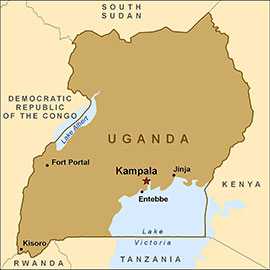Today, Uganda joins the rest of the world for the 35th National World Food Day celebrations. The UN Governing Council November 1979 declared 16th October of every year to be the day to celebrate World Food Day.
It is also the same day that the Food and Agriculture Organization of the United Nation (FAO) was founded In Québec, Canada in 1945.
All governments, national and international organizations in the world take time to reflect on the status of food security, hunger, malnutrition, poverty and agricultural development issues.
The World Food Day is celebrated every year under different themes. The theme for this year is “change the future of Migration, invest in food security and Rural Development’’.
The theme recognizes the negative effects on migration on food security and rural development.
Migration is in two forms; internal migration and international migration (refugees).
In Uganda the influx of refugees has been high. This calls for increased food production to support the growing population in refugee c amps.
This will be done through building resilience of agricultural livelihoods and landscapes to ensure sustainable food security and wealth creation
World Food Day Celebrations present an opportunity to discuss salient issues affecting food security, hunger, malnutrition and poverty.
The world food day sets a platform for local and foreign companies, public and private organizations’, institutions to display their innovations, improved technologies and practices for better production, processing and marketing in Agriculture.
The vision of the Ministry of Agriculture, Animal Industry & Fisheries is to transform agriculture into a competitive, profitable and sustainable sector. The sector has continued to register positive growth over the years.
Agriculture growth rate has risen from 0.8 in 2011/12 to 3.2% 2015/16.
The sector contribution to GDP is currently 26.2 %. The target is to raise it to 5.6% as stated in the National Development Plan 2 and Vision 2040.
The sector continues to play an important role in food security and nutrition, employment, wealth creation, the manufacturing industry and export trade.
The Ministry has developed the Agriculture Sector Strategic Plan (ASSP) 2015/16 to 2019/20 which is fully aligned to the National Development Plan (NDP II) with the core objectives to;
- Increase incomes through increasing production and productivity
- Ensure household food and nutrition security
- Create on-farm and off-farm employment opportunities
- Promote value-addition to agricultural products
- Promote domestic and external trade in agricultural products
The Ministry will continue, over the medium term to pursue policies and interventions that promote increased value addition, in order to improve our foreign exchange base. The Government will pursue interventions aimed at boosting the export potential so as to significantly reduce the import bill.
For example through NAADS/Operation Wealth Creation (OWC);
Increasing coffee production from the current 3,531,200 bags, of which 3,237,924 bags were exported generating US$ 410.064m to 20 million bags by 2020, valued at approx. USD 2.4 billion.
This will be made possible by promoting elite varieties resistant to wilt, and distribution of 100 million coffee seedlings per annum, expanding the area under coffee production by 5% in traditional areas and 25% in new areas and also addressing the agronomical challenges through provision of extension services.
The tea industry has also made tremendous progress in the last 10 years with production at 61,376 MT, of which 60,504 MT were exported generating US$ 84.7m. Our target is to produce 135,308 MT by 2020, valued at approx.USD190m.
The Government will continue supporting the production and distribution of 34,965,000 quality tea plantlets per annum through Operation Wealth Creation programme.


















